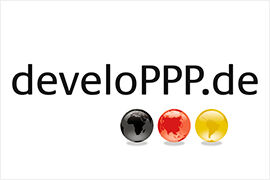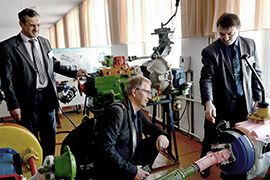The 3x3 for dual vocational training
Strategic alliance on dual vocational training takes off in Kazakhstan
28.04.2015
Countering the lack of skilled labour in industry, offering young people in the country better vocational prospects, reducing youth unemployment – Kazakhstan has set concrete goals for the reform of its educational system.
The reform of the dual vocational training system is currently in its first phase. Overall, the government of Kazakhstan intends to introduce ten training professions which are important to the industry in selected regions.
The government is being assisted in this by the Deutsche Gesellschaft für Internationale Zusammenarbeit (GIZ) GmbH and four private sector companies: Claas Global Sales GmbH, Evonik Industries AG, HeidelbergCement and John Deere International GmbH. They have joined in a strategic alliance under the develoPPP.de programme to establish a dual vocational training system based on the German model, together with local companies. For this purpose, three vocational training courses will be introduced at vocational colleges in three of Kazakhstan’s provinces. The first planning workshops were held in the regions involved in March, with private sector participation.

While HeidelbergCement is establishing a training course for industrial mechanics at a construction college in eastern Kazakhstan, Class Global Sales GmbH and John Deere are advising the Transport College in Kostanay on establishing a dual training course for agricultural mechatronics. Evonik Industries AG is promoting training for electronic engineers and electronic technicians for automation technology at Temirtau Polytechnic College in the Karaganda region. This vocational qualification is in demand by companies in the raw materials, steel and metalworking industry and numerous other sectors.
Constanze Majer, develoPPP.de project manager at GIZ, expects that the new vocational training courses will be available in the new 2015 academic year. ‘I see great potential for the dual vocational training system in Kazakhstan,’ Majer says. ‘The qualifications of the graduates now match up much better with the needs of the companies. In addition, the dual training system ensures a high rate of transfer to employment, which will have a positive impact on employment of skilled young people in Kazakhstan.’
The growing diversification of the Kazakh economy since its independence in 1990 and the location of hi-tech industries in the country have also led to a need for more highly qualified experts. In recent years, the number of graduates of vocational schools has met only around 30-40% of demand. In addition, many young people under 25 are unemployed despite having a vocational qualification, as the standards do not meet the needs of employers.
The develoPPP.de programme
For over 15 years GIZ has been promoting entrepreneurial commitment in developing and emerging countries on behalf of the German Federal Ministry for Economic Cooperation and Development (BMZ). You will find more information on the conditions and opportunities for cooperation between GIZ and the private sector and on the current application deadlines on the develoPPP.de website at www.develoPPP.de.
Contact: constanze.majer@giz.de
GIZ is represented at the state-secretary and working levels on the Round Table for International Vocational Education and Training Cooperation. GOVET is the administrative arm of the Round Table.
